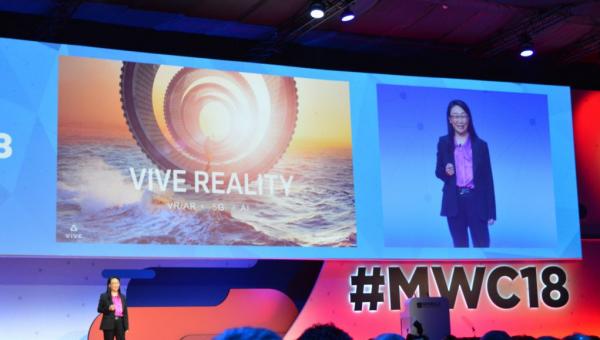MWC│在管理层洗牌之后,HTC表示,VR/AR比以往任何时候都更重要

More Important Than Ever to Its Future
At this year’s Mobile World Congress (MWC) in Barcelona, HTC CEO Cher Wang took the stage to outline the company’s big picture approach to the future. The company is ostensibly putting increased focus on VR/AR with their newly coined ethos ‘Vive Reality’.
In the wake of the resignation of Chailin Chang, HTC’s President of Smartphone and Connected Devices Business, and the resultant merging of the company’s VR and smartphone divisions, the Taiwan-based manufacturer seems to be putting more emphasis on immersive platforms than ever according to a future outlined in today’s keynote.
To HTC, the near future will be a 5G-connected world where VR/AR devices expand their abilities thanks to cloud computing and AI; plenty of tech buzzwords to digest, but demonstrative of the company’s reliance on its VR platforms – Vive, Vive Pro, and Vive Focus, the company’s China-only 6DoF mobile VR headset.

While neither a timeframe nor specific plans for the company’s future were revealed in Wang’s keynote, her vision for the company appears much less smartphone-oriented, saying that while smartphones will “continue to play a vital part in the ecosystem, and will be the first step toward 5G for most of us,” that ultimately 5G networks “will enable every single VR and AR terminal to be the most powerful device in the world.”
“5G will massively enlarge VR and AR capabilities by leveraging supercomputing power in the cloud while lowering device power consumption. VR and AR will no longer be constrained to local hardware and storage. Virtual and augmented reality are part of the ‘virtuality’ continuum. They will be combined in different proportions in devices in the future depending on our needs. Cloud computing over 5G will enable every single VR and AR terminal to be the most powerful device in the world, bringing a more immersive experiences than ever. Smartphones will continue to play a vital part in the ecosystem, and will be the first step toward 5G for most of us. Smartphones may look different from the shiny rectangles that we know and love today. I think they will also take on other forms as 5G reduces the need for device-based computing power. In the future, the screen may be cobbled away from smartphones and displayed to our AR or VR devices, or directly even projected right onto our eyes.”
Wang further underlined its importance, saying that VR and AR devices will serve as the “the most essential portal to access AI.”
It makes sense that HTC is investing more time and money in its more successful ventures, and cutting its losses where it can. Having recently sold off much of its smartphone team to Google in a $1.1 billion deal, which saw half of HTC’s smartphone R&D division transferred to Google, the company has clearly reduced its ability to compete in at the same level globally.

最新活动更多
-
7.30-8.1火热报名中>> 全数会2025(第六届)机器人及智能工厂展
-
精彩回顾立即查看>> 【线下论坛】新唐科技2025新品发布会
-
精彩回顾立即查看>> 【在线直播】解密行业检测流量密码——电子与半导体行业
-
精彩回顾立即查看>> 【深圳 IEAE】2025 消费新场景创新与实践论坛
-
精彩回顾立即查看>> 【限时免费】安森美:Treo 平台带来出色的精密模拟
-
精彩回顾立即查看>> 【在线会议】ImSym 开启全流程成像仿真时代
推荐专题







 分享
分享












发表评论
请输入评论内容...
请输入评论/评论长度6~500个字
暂无评论
暂无评论